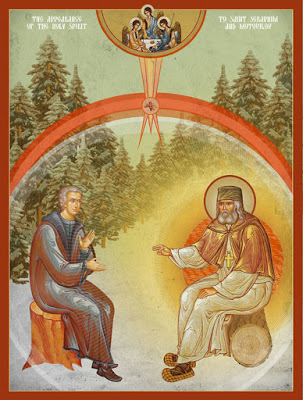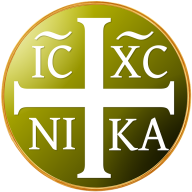This brief reflection was submitted to Public Orthodoxy in May 2017, shortly after the appearance of Conjugal Friendship and three months before the launch of Orthodoxy in Dialogue, in response to The Power of Sexual Purity by Drs. David and Mary Ford. It has lain forgotten in an email file until now.
In his conversation with Nicholas Motovilov, St. Seraphim of Sarov offers a succinct elucidation of life in Christ:

The true aim of our Christian life consists in the acquisition of the Holy Spirit of God. As for fasts, and vigils, and prayer, and almsgiving, and every good deed done for Christ’s sake, they are only means of acquiring the Holy Spirit of God.
And again:
In the parable of the wise and foolish virgins, when the foolish ones lacked oil, it was said: “Go and buy in the market.” But when they had bought, the door of the bridal chamber was already shut and they could not get in. Some say that the lack of oil in the lamps of the foolish virgins means a lack of good deeds in their lifetime. Such an interpretation is not quite correct. Why should they be lacking in good deeds if they are called virgins, even though foolish ones? Virginity is the supreme virtue, an angelic state, and it could take the place of all other good works.
I think that what they were lacking was the grace of the All-Holy Spirit of God. These virgins practiced the virtues, but in their spiritual ignorance they supposed that the Christian life consisted merely in doing good works.
St. Seraphim’s teaching recalls a turning point in the Gospels: “From my youth I have avoided murder, sexual impurity, theft. I have never borne false witness. I have honoured my parents. I am already a moral person. What do I still lack?” With the rich young ruler we perceive that the life bestowed on us by the Holy Spirit utterly eclipses mere morals and good behaviour. The Lord’s voice beckons, If you would be perfect…. The “perfection” to which He calls us—“even as your heavenly Father is perfect”—signifies infinitely more than the achievement of a morally upstanding life, a category absurdly inapplicable to God.
Through the boundless plenitude of uncreated grace in collaboration with our meagre ascetical effort, the Holy Spirit transfigures us by slow degrees in the Church’s mystical life, unto the completion of our personal being after the pattern of the Son, united to the Holy Trinity, to one another, to the whole cosmos visible and invisible—“even as” God actualizes without beginning or end the completeness of His tri-personal being. The Holy Spirit transforms us by divine grace into all that the Son is by nature, seating us with the Son in the place of equal glory with God at the Father’s right hand. St. Maximus the Confessor proclaims with breathtaking audacity that we become God in our deification to no less a degree than He became man in His humanization: as fully as He became man by nature, so fully do we become God by participation.
Here we have no desiccated, spiritually vacuous bourgeois moralism—of interest to no sentient human being in a postmodern world grown weary of Christian conventionalism—no religious gloss of social respectability on an otherwise egocentric and consumeristic existence masquerading as life in Christ.
Our puny but necessary contribution to the work of our salvation in fear and trembling consists in a life of peace and repentance, in ceaselessly turning around, changing our mind, falling down and getting up. “Like cast-off rags is my so-called righteousness,” the prayer book teaches us to lament as we stand before God as the first among sinners, the sinner, the only sinner. “No one commits the sins that I commit. No one does the things that I do. I am worse than the harlot, yet with polluted lips I dare approach Thee.” The bishop or priest, standing before the Lord’s Table, confesses through his tears: “No one who is bound with the desires and pleasures of the flesh is worthy to approach or draw near or to serve Thee, O King of glory.”
Repentance entails the cultivation of σωφροσύνη, sophrosyne, rendered so inadequately in English as “chastity.” Its meaning conveys moderation, prudence, self-control, a sound mind in all things, certainly including but not limited to sexual desire. The Slavonic translates it as цѣломудріе, tselomudrie, “whole wisdom.” Our spiritual writers understand it as the reintegration of the human person in the wholeness of our psychosomatic structure, received humbly as a gift of grace and not vaunted as a personal accomplishment. St. Maximus considers the care of the poor as no less crucial than bodily purity to the process of becoming God. Father Dumitru Stăniloae cautions that, no matter how far apart we may seem morally and spiritually, the greatest saints and the greatest sinners stand huddled rather close together compared to the distance that we have yet to traverse to reach God.
The sexual revolution was bound to happen. The Church no longer presented herself to the world as the mystical union of God and man, heaven and earth, man and man, God and the cosmos, man and the cosmos. She degenerated into “Christianity,” just one more “ism” in some languages, another “religion” imposing its “morals and values” on an unwilling public, a mechanism for state coercion and even persecution, a haven of middle class morality and a sorry substitute for Life in abundance. Sexual revolutionaries want to live, to experience life at its most direct, to eschew the hypocritical veneer of bourgeois respectability.
Some of the most spiritually receptive people with whom I have ever spoken are “promiscuous” non-believers in queer studies—and yes, they want to hear a spiritual, and anthropological, and ascetical explanation of sexual chastity, not moralistic, or legalistic, or fear-mongering, or shaming. Surely their sincere openness to these questions reveals the gentle power of the Holy Spirit wafting as a life-giving breath through this world that He helped bring into being. This is the world that God loved so much that He sent His only-begotten Son—as St. Maximus and St. Symeon the New Theologian tell it—to take her into His marriage bed and make love to her.
He has no interest in finding a bride among the self-righteous.
See the Anglican Church and Same-Sex Marriage, Bridging Voices, Fifty Years after Stonewall, Sexuality and Gender, and Warwick Files sections in our Archives 2017-19 and/or Archives 2020.
Giacomo Sanfilippo is an Orthodox Christian, PhD student in Theological Studies at Trinity College in the University of Toronto, former priest, father of five, grandfather of two, and founding editor of Orthodoxy in Dialogue. He holds a BA in Sexuality Studies from York University in Toronto and an MA in Theology from Regis College/St. Michael’s College at the University of Toronto. He is an alumnus of the Mark S. Bonham Centre for Sexual Diversity Studies at the University of Toronto, and earlier in life completed the course requirements for the MDiv at St. Vladimir’s Orthodox Theological Seminary. He is presently preparing for his comprehensive exams in August, and hopes to begin writing his dissertation soon. It has a working title of “Conjugal Friendship: Father Pavel Florensky and His Theology of Same-Sex Love.”


Pingback: IN CASE YOU MISSED IT: JULY | ORTHODOXY IN DIALOGUE
Pingback: FATHER SERAPHIM OF MULL MONASTERY FORCED TO ADDRESS ORTHODOXY IN DIALOGUE’S SUPPORT FOR HIM | ORTHODOXY IN DIALOGUE
Pingback: MICHAEL SISCO’S LATEST PETITION TO THE ASSEMBLY OF BISHOPS: EXCOMMUNICATE EVERYONE | ORTHODOXY IN DIALOGUE